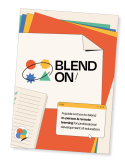In Practice
Radio Professional Development for Teachers in Uganda | by STiR Education
During COVID-19, STiR Education developed an approach to leverage its expertise, capacity and networks to support the Ministry of Education and Sports to address its emergency priorities. Connectivity and technological challenges presented significant barriers to delivering this curriculum online. We aimed to broadcast 30-minute radio sessions through up to 15 different radio stations across 32 districts. Radio is one of the longest serving and most accessible education technology in Uganda.
We launched a bi-weekly, radio-based continuous professional development programme (CPD) for teachers in 32 districts and 8 municipalities. This would involve:
- Production of a 30-minute lesson for all teachers across subjects and phases delivered over radio every two weeks.
- Use of evidence-based teaching strategies.
- Follow up support materials for school leaders and education managers.
- Weekly support calls to officials.
- Bi-weekly head teacher conference calls.
- Share audio and printed CPD content via WhatsApp.
What worked
- Radio lessons motivated teachers and excited them about being resilient and supporting their learners.
- Radio built momentum and helped teachers in the subsequent return to classrooms because they had learned social emotional strategies.
- It promoted local ownership and support from district education officers.
- The shared recordings of the radio sessions helped many teachers to access the content.
- WhatsApp learning networks were used to collect feedback from teachers, and share success stories, challenges and learnings.
- Group phone conference calls helped continuing reflection meetings and increase resilience and coping with the pandemic.
- Follow-up support materials to support further learning, delivered via WhatsApp.
Challenges
- Initially, many sessions were not broadcast on the agreed date or time, which risked disengaging teachers.
- Access to radio sessions varied between districts.
- There was limited follow-up on action plans by the teachers because the schools were shut down.
- Poor network connectivity presented challenges to our regular calls with school leaders and district officials.
Learnings
- We need to be flexible in our programme design and delivery to adapt to using approaches that are relevant in the context.
- Blended use of radio, phone group coaching and WhatsApp increased the engagement of school leaders and teachers in professional development during the pandemic.
- Actively identify and reflect upon the challenges of remote delivery in offline contexts and use the reflections to iterate and improve.
Share this practice:
In Practice
You can find out more practical use cases here
Subscribe to newsletter

Download our guide for a more in-depth and comprehensive look at developing a successful blended CPD programme.
© Copyright 2023 VVOB - vvob.org